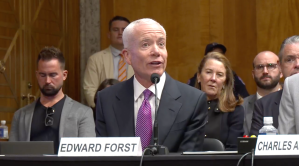GSA to lead governmentwide shared services pilot team
The General Services Administration will lead a new federal pilot to manage shared services from an enterprisewide perspective, officials announced Thursday.
At the heart of a new Office of Management and Budget governance model to look more strategically at implementing shared services across the federal enterprise, GSA will play an integral role leading the so-called Unified Shared Services Management team. GSA Administrator Denise Turner Roth said the team — housed in the agency’s Office of Governmentwide Policy — will oversee the daily operations of OMB’s shared services management and oversight structure.
During a panel Thursday hosted by the Partnership for Public Service, Turner Roth explained that rather than taking an ad-hoc approach each time an agency looks to set up a shared service, the USSM team will lead a more concerted effort for the federal government to administer shared services as one enterprise. “The idea that we will not be multiple entities operating and trying to figure out the same way to put the puzzle together but actually coming together and doing the puzzle in one format and setting — that really ensures the platform for success from my perspective.”
She added: So far, the agencies engaged in shared services are those “ready to invest and double down, really trying to find a way on their own. And it is important for us to realize that we are not building for a single unit, but we’re building for an entire government.”
President Barack Obama pushed in 2014 as part of his President’s Management Agenda to streamline federal service delivery through shared services — when departments with expertise in core administrative functions consolidate by providing them as services to other U.S. agencies less knowledgeable in those lines of business. Shared services typically include things like payroll, procurement or other administrative functions.
With the assistance of a shared services governance board, USSM must select enterprisewide shared service providers — which could range from other federal agencies to private service contracts — in various areas for federal agencies.
Beth Angerman — executive director of the Treasury Department’s Office of Financial Innovation and Transformation, and a champion for federal shared services — will take a detail at GSA to stand up and lead the USSM team, which is anticipated to launch sometime in the second quarter of fiscal year 2016. Under the watch of Angerman and others, Treasury has emerged as a sort of center of excellence for shared services, most recently celebrated for taking on the Department of Housing and Urban Development’s financial management and procurement operations, a first for a Cabinet-level agency.
This team, added Dave Mader, acting deputy director for management at OMB, will “ensure that we actually accomplish what we say we’re going to” within the new policy model, which he said will initially focus in on five high-priority shared service lines of business: acquisitions, financial management, human resources, IT and travel.
The team’s immediate goal, Turner Roth said, is to prove “that the effort itself will actually be of good benefit to the clients, to those who are shared service providers, to those who are looking to divest or to stand up an effort.”
“Our first step is to demonstrate that it actually does have an additive value, and that it is something that is worthwhile and beneficial,” she said. “It then needs to become the expected rule as opposed the excepted rule. And then we need to invest and support it and make it a priority.”
But the new governance model came with a caveat. Mader and Turner Roth referenced the need to work aggressively to make an impact before the turnover of a new administration in 2017.
“We have about 18 months in the capacities we’re in to drive as much as we can,” Turner Roth said.
The plan, Mader said, is to be at a point where this administration can hand off its progress and a working strategy the day after the next inauguration. “What I hope that happens, at least over the next 16 to 18 months, is that when the new administration comes in, they go, ‘They’re on the right track. We need to invest more and build on it,'” he said. “Because what we’re doing is good government … This doesn’t have an R or a D [party label] on it. It’s about good government.”






